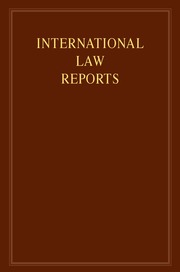No CrossRef data available.
Article contents
JuRI-Nepal (Justice and Rights Organization) and Others v. Government of Nepal and Others
Published online by Cambridge University Press: 01 January 2021
Abstract
Relationship of international law and municipal law — Treaties — Application — Implementation — Human rights treaties — Nepal party to principal human rights instruments — International human rights law — International humanitarian law — Comprehensive Peace Accord ending civil war in Nepal — Interim Constitution of Nepal 1997, Article 33 — Nepal Treaty Act 1990, section 9(1) — Nepalese Supreme Court directive orders — Decisions of regional Human Rights Courts — Serious human rights violations committed during Nepalese conflict — Enforced disappearances — Constitution providing for establishment of Truth and Reconciliation Commission — Ordinance on Investigation of Disappeared People, Truth and Reconciliation Commission — Whether single Commission appropriate — Whether separate Commission to be established to investigate enforced disappearances — Whether restrictions on criminal prosecutions and executive discretion lawful — Ordinance giving Commission power to grant amnesty for serious human rights violations — Prohibition on amnesties for serious human rights violations under international law — Rights of victims under Constitution — Constitutionality of Ordinance — Whether sections 13, 23, 25 and 29 of Ordinance consistent with Articles 12, 13, 26 and 32 of Constitution — Whether Ordinance in breach of Nepal’s international legal obligations — Whether orders of certiorari and mandamus requested by petitioners to be issued
Human rights — Gross human rights violations committed during civil war in Nepal — Enforced disappearances — Nepali people seeking justice, truth and reparation — Amnesty — Rights of victims to justice — Right to freedom — Right to equality — Right to a fair trial — Right to remedy — Transitional justice mechanisms — Interim Constitution of Nepal 1997 — Constitution providing for establishment of Truth and Reconciliation Commission — Ordinance on Investigation of Disappeared People, Truth and Reconciliation Commission — Whether single Commission appropriate — Whether separate Commission to be established to investigate enforced disappearances — Whether restrictions on criminal prosecutions and executive discretion lawful — Ordinance giving Commission power to grant amnesty for serious human rights violations — Whether serious human rights violations subject to amnesty — Prohibition on amnesties for serious human rights violations under international law — Constitutionality of Ordinance — Whether sections 13, 23, 25 and 29 of Ordinance consistent with Articles 12, 13, 26 and 32 of Constitution — Whether Ordinance in breach of Nepal’s international legal obligations
War and armed conflict — Civil war in Nepal 1996-2006 — Commission of serious human rights violations during conflict — Enforced disappearances — Comprehensive Peace Accord — Interim Constitution of Nepal 2007 — Provision for establishment of Truth and Reconciliation Commission — Transitional justice in Nepal — Ordinance on Investigation of Disappeared People, Truth and Reconciliation Commission — Whether single Commission appropriate — Whether separate Commission to be established to investigate enforced disappearances — Whether restrictions on criminal prosecutions and executive discretion lawful — Ordinance giving Commission power to grant amnesty for serious human rights violations — Whether Ordinance consistent with Constitution — Whether Ordinance in breach of Nepal’s international legal obligations — The law of Nepal
- Type
- Case Report
- Information
- Copyright
- © Cambridge University Press 2015




